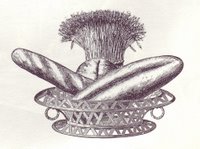 Today, June 5th …
Today, June 5th …Popular myth has it that the nursery rhyme “Little Miss Muffet” was about the daughter of Thomas Moffett, a physician and entomologist who died on this day in 1604. It is pure myth, but it is easy to see how the connection arose. Moffett (Muffet, Mouffat) was a physician and interested in nutrition and his particular hobby was spiders.
His posthumously published book “Health’s Improvement” gives great insight into medical and nutritional ideas of the day.
Sea-birds were a mystery with religious implications:
Puffins being Birds and no Birds, that is to say Birds in shew and fish in substance, or (as one may justly call them), feathered fishes, are ill taste and worse digestion; how dainty so ever they seem to strange appetites, and are permitted by Popes to be eaten in Lent.
Ideas of “terroir” are not new:
The best Mutton is … that which is taken from a short hilly and dry feeding, is more sweet short and wholesome, then that which is either fed in rank grounds, or with pease-straw (as we perceive by the taste) great fat and ranck fed sheep, such as Somersetshire and Lincolnshire sendeth up to London, are nothing so short nor pleasant in eating, as the Norfolk, Wiltshire, and Welsh mutton …
Neither is food snobbery:
Barnicles both breed unnaturally by corruption, and taste very unsavoury. Poor men eat them, rich men hate them, and wise men reject them when they have other meat.
Bread, however, was truly the Staff of Life, “never out of season, disagreeing with no sickness, age or complexion”, and a fine inspiration along with the mythical Miss Muffet for our recipe for the day, from “The Compleat Cook” (1655).
To make a great Curd Loafe.
Take the Curds of three quarts of new milk cleane wheyed and rub into them a little of the finest flower [flour] you can get, then take half a race of Ginger, and slice it very thin, and put inot your Curds with a little salt, then take halfe a pint of good Ale yeast and put to it, then take tenne Eggs but three of the whites, let there be so much flower as will make it into a reasonable stiffe Past [paste], then put into an indifferent hot Cloath, and lay it before the fire to rise while your Oven is heating, then make it up into a Loaf, and when it is Baked, cut up the top of the Loaf, and put in a pound and a halfe of melted Butter, and a good deale of Sugar in it.
Tomorrow: Ices, baked.
Quotation for the Day …
Acorns were good till bread was found. Francis Bacon
No comments:
Post a Comment